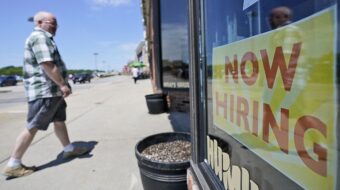Commentary
Fifty bullets. One bullet can kill a person — imagine what 50 did to 21-year-old Sean Bell and his two friends. What happened to these three unarmed young men on Nov. 25 in Queens, N.Y., is a horror, a tragedy — and a crime.
As is obvious, something is profoundly wrong in New York City. What the police did that night was indefensible, but unfortunately not unprecedented. The list of those shot dead by city police officers over the years includes kids and women. (Remember Eleanor Bumpers?)
Outrage goes beyond the Black community, as it should. People across the city are shocked by the violence of this act, and horrified that those who are supposed to uphold the law and protect innocent people can do the opposite.
Clearly, though, African American, Latino, Caribbean, African, South Asian, Arab and other racially oppressed people have the sharpest concerns here. It is simply dangerous to be Black in this city, especially if you are young and male. That has to change.
As many have said, there must be more than conversation; there must be action. Calls for a special prosecutor and that the utmost urgency and speed be given to the investigation of Sean Bell’s killing are absolutely right. How could such a crisis not require emergency steps?
Obviously, the New York Police Department needs the most serious and thorough examination of, and changes made in, its procedures, culture and leadership, which bear the markings of Mayor Giuliani’s tenure. It’s time to raise again the concept of a civilian control board with real powers and real teeth.
A multiracial, multicultural, multimillion-person city like New York requires a special kind of police, one that serves, protects and is accountable to all the people.
But the problem, of course, is much bigger than the police commissioner or the NYPD. And that is because the problem is systemic — it is the institutionalized racism that permeates our society, the effects of which include relentless poverty, joblessness, low graduation rates, substandard housing and segregation and epidemics of curable illnesses, to name the most egregious.
How to change the perception of African American and Latino young people as criminals? That will require action on many levels, changes in the police, including much more vigorous recruiting in those communities but not only that.
It requires fully funding public education, so that kids stay in school and graduate, and graduate with skills.
It will require making the CUNY, the city college system, more accessible and affordable to working-class young people — as it used to be.
It will require jobs — good jobs.
It means stopping the hemorrhage of affordable housing — if you can’t afford to live here, and there are no good jobs here, what kind of life does the city offer?
We have a new governor — it’s time to abolish the Rockefeller Drug Laws, which have produced the disproportionately high rates of incarceration and an atmosphere of suspicion and hostility towards African Americans and Latinos.
Are there solutions to this situation? Of course — there must be the political will, though, and resources. Changes must go beyond the surface of the problem.
These matters cannot be left to the present leadership of the police department, which has proved unable or unwilling to really change the situation. Nor can it be left to Mayor Bloomberg and the other billionaires who decide everything in this city. There is a need for some kind of people’s summit, to develop a plan of action, and all kinds of mass pressure and action to win it.
Elena Mora (emora @ cpusa.org) is the chair of the New York State Communist Party.











Comments